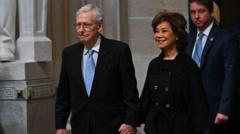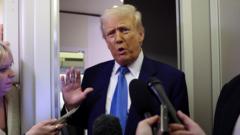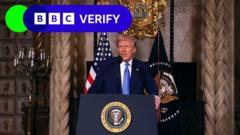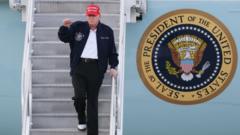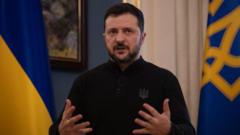The situation reveals underlying tensions as Ukraine asserts its non-negotiable involvement in any agreements about its future.
**Ukraine Excluded from US-Russia Peace Negotiations Amidst Growing Concerns**
**Ukraine Excluded from US-Russia Peace Negotiations Amidst Growing Concerns**
Ukrainian officials express frustration over not being invited to key talks aimed at ending the ongoing conflict.
In a significant development in the ongoing conflict in Ukraine, a senior Ukrainian government source disclosed to the BBC that Ukraine has not been invited to US-Russia peace talks taking place in Saudi Arabia. This comes despite earlier assurances from US special envoy to Ukraine, Keith Kellogg, that Kyiv would participate in the discussions. Kharkiv has grown increasingly wary of being excluded from negotiations concerning its territorial integrity and future.
This situation occurs simultaneously with European leaders scheduling a separate meeting in Paris, highlighting their apprehensions about being sidelined from critical dialogues related to the war. As it stands, French President Emmanuel Macron is set to lead a conference focusing on Ukraine and European security. This division in diplomatic efforts raises alarms among European nations regarding their relevance in shaping the outcomes of the crisis.
The context of these talks shows a shift in the US's approach to the war, as indicated by recent statements from top officials. Notably, the US Middle East envoy, Steve Witkoff, confirmed he would engage directly with Russian negotiators. Witkoff, formerly not a professional diplomat but a close associate of President Trump, has already met with Russian President Vladimir Putin, bringing forward mixed sentiments from both sides.
President Trump voiced expectations of Ukrainian involvement, albeit without offering specific details on how this integration would transpire. Through recent statements, he pointed at previous administration policies as a cause for the continuing conflict, thus hinting at a pivot in US foreign policy regarding Ukraine.
Yet, some US officials downplayed the significance of the Saudi meeting, suggesting that one encounter would not resolve the protracted conflict. Senator Marco Rubio mentioned that establishing a formal negotiation process is still pending, calling into question the seriousness of Russia's intentions towards achieving peace.
Amidst these geopolitical maneuvers, President Zelensky reiterated his firm stance, stating it would be unacceptable for any peace agreements to be made without direct Ukrainian participation. This sentiment was echoed during his recent media interactions, where he expressed that Ukraine must be central in any discussions impacting its sovereignty.
Domestically, challenges persist as Ukraine continues to grapple with humanitarian crises resulting from ongoing military actions, exemplified by recent drone strikes causing widespread power outages across regions, including Mykolaiv.
Overall, the unfolding situation not only emphasizes Ukraine's determination to retain control over its diplomatic narrative but also signals broader implications for international relations and security in Europe amid rising tensions between the West and Russia.
This situation occurs simultaneously with European leaders scheduling a separate meeting in Paris, highlighting their apprehensions about being sidelined from critical dialogues related to the war. As it stands, French President Emmanuel Macron is set to lead a conference focusing on Ukraine and European security. This division in diplomatic efforts raises alarms among European nations regarding their relevance in shaping the outcomes of the crisis.
The context of these talks shows a shift in the US's approach to the war, as indicated by recent statements from top officials. Notably, the US Middle East envoy, Steve Witkoff, confirmed he would engage directly with Russian negotiators. Witkoff, formerly not a professional diplomat but a close associate of President Trump, has already met with Russian President Vladimir Putin, bringing forward mixed sentiments from both sides.
President Trump voiced expectations of Ukrainian involvement, albeit without offering specific details on how this integration would transpire. Through recent statements, he pointed at previous administration policies as a cause for the continuing conflict, thus hinting at a pivot in US foreign policy regarding Ukraine.
Yet, some US officials downplayed the significance of the Saudi meeting, suggesting that one encounter would not resolve the protracted conflict. Senator Marco Rubio mentioned that establishing a formal negotiation process is still pending, calling into question the seriousness of Russia's intentions towards achieving peace.
Amidst these geopolitical maneuvers, President Zelensky reiterated his firm stance, stating it would be unacceptable for any peace agreements to be made without direct Ukrainian participation. This sentiment was echoed during his recent media interactions, where he expressed that Ukraine must be central in any discussions impacting its sovereignty.
Domestically, challenges persist as Ukraine continues to grapple with humanitarian crises resulting from ongoing military actions, exemplified by recent drone strikes causing widespread power outages across regions, including Mykolaiv.
Overall, the unfolding situation not only emphasizes Ukraine's determination to retain control over its diplomatic narrative but also signals broader implications for international relations and security in Europe amid rising tensions between the West and Russia.


